Mum and daughter’s special affinity with the Derry Feis
and live on Freeview channel 276
The apple, as the cliché dictates however, rarely falls far from the tree. It is no coincidence that the skills displayed by Marie-Louise in her working life were genetically delivered from, nurtured and then finely tuned by her mother Carita Kerr.
Carita spent her working life as a special needs teacher but also famously taught speech, drama and singing. Her classically trained and exceptionally naturally gifted singing voice was also often the envy of many of her fellow competitors on the performance platforms of Feis Doire Colmcille.
Advertisement
Hide AdAdvertisement
Hide AdMarie-Louise said: “I was really young the first time I competed. We were living in Newry at the time and going up to Derry Feis was the most wonderful thing. Mum and I stayed in the Everglades and I remember being so taken by that. It was so exciting. There was a television in the bedroom and I was just really amazed by that. And, then I was allowed to stay up really late and sit in the Guildhall as mum’s competitions went on until one or half-one in the morning. But, I just knew that my mum’s singing voice was legendary.
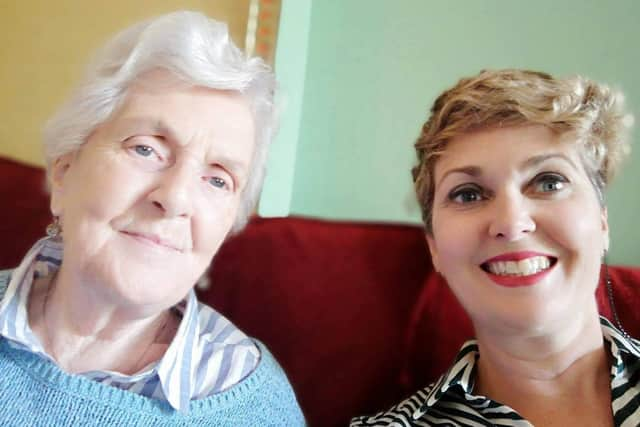

“I know I am completely biased but I knew that as soon as she walked onto the stage of the Guildhall and she opened her mouth to sing, I would sit there and watch, not her, but the adjudicator. That was because I knew they’d never heard a voice like this before. I seriously mean that, it was such an extraordinary voice. So, I’d look at the adjudicator and wait to see his or her reaction.
“James MacCafferty would be accompanying and there would be a big, dramatic opening and after the first two or three notes came out, to a man or a woman they’d be sitting there writing their notes on the previous singer and then as soon as my mum started singing they immediately stopped and looked up. I was always so chuffed.”
In 1977 when Marie-Louise made her first appearance at the feis, recalling that she recited a poem and thinks that she may have played in a cello competition, her mother was busy compiling a unique feat of winning every major singing title the feis had to offer.
Advertisement
Hide AdAdvertisement
Hide AdMarie-Louise continued: “There is a photograph of mum and I pictured with all the cups that year that appeared in the ‘Journal’. I think I had won a third in something but then people kept asking me ‘wow, did you win all those cups as well?’ I had to say no. Then, I would be the one that every weekend had to do the dusting of the house and I had to dust and polish the silverware to make sure it was right before it all went back to the feis.
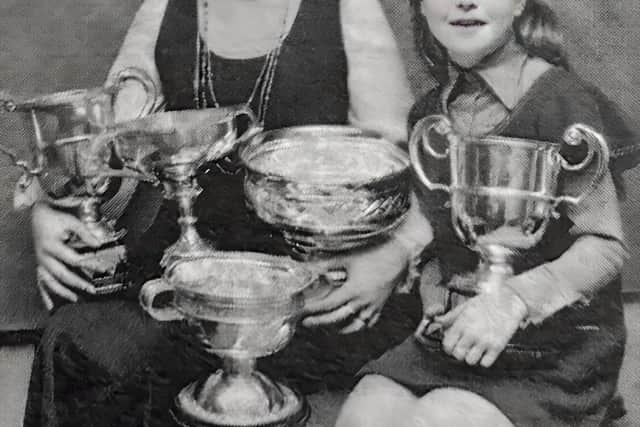

“Literally on the way home it was like we’d raided the crown jewels. We arrived with an empty back seat in the car in Derry and on the way back you just knew it was going to be laden with cups.”
Carita said: “I remember one year I came up from Newry and was travelling back after one o’clock in the morning and was stopped at Caledon by the UDR. We also made a joke about Caledon that you never saw anybody there and wondered if anyone actually lived there. But, it was my bad luck to run into these very elderly gentlemen and it was a terrible night and one of them said, ‘where are you coming from?’ I said Derry. Then he said ‘where are you going?’ I said Newry. Then he asked ‘what was your business there?’ I answered that I’d been singing in a couple of competitions. All the time I was thinking dear God, don’t let them put their flashlight into the back seat because all they’ll see is silver and they’ll think they’ve caught a burglar.
“The Derry Feis was set in stone and there was no way that I wasn’t going to be there. Your primary aim was to compete but the other thing was that you met all your friends. As Marie-Louise said, and I’ll pay her fee later, because she gets more expensive every year to tell lies about how good my voice was, but I am a Buncrana woman and this was terribly galling for the singers in Derry.
Advertisement
Hide AdAdvertisement
Hide Ad“I didn’t follow the usual pattern of a feis person. All the people competing against me had started when they were four or five so they had been part of this amazing event for 20 or 30 years and I arrived up from Buncrana - a total blow-in. So after a couple of years when I’d arrive at the bottom of the Guildhall stairs there was a gang of them standing at the top saying ‘Carita, for God’s sake will you go home and give the rest of us a chance’. The camaraderie was amazing. They just expected that well, we’ll not be number one because your woman is on again. It was so funny but they were great friends. It was just an amazing place.”
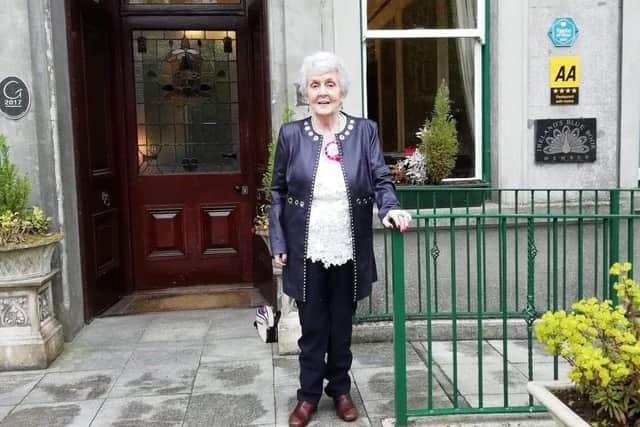

The esteem in which the week-long festival was and is held can often be hard to explain to those who never took part or even attended to watch the competitions take place. However that isn’t an issue for this mother and daughter.
Marie-Louise said: “It was such an event as well. The way people getting excited about TV talent shows now, about the Simon Cowells and Louis Walshs, but to be in the Derry Feis to compete and to be seen, that was your talent show. That was where you knew the real deal was happening and would have heard so many great singers and musicians over the years.”
Carita added: “There was so much talent. So much natural talent. They didn’t need microphones or any mechanical help at all. You just opened your mouth and sang, which was what made it really special.”
Advertisement
Hide AdAdvertisement
Hide AdMarie-Louise continued: “I was in the youth orchestra as well and you would have incredible musicians getting up to perform in their competitions. I am thinking of people like Gerard McChrystal who was a clarinetist and is a saxophonist now. I was also there with the school orchestra from Thornhill and the school choir under Mrs McGinley at the time. And, you’d be standing there, particularly when it was the Irish language song and I was of smaller stature and was always put on the front row and I didn’t know the words.
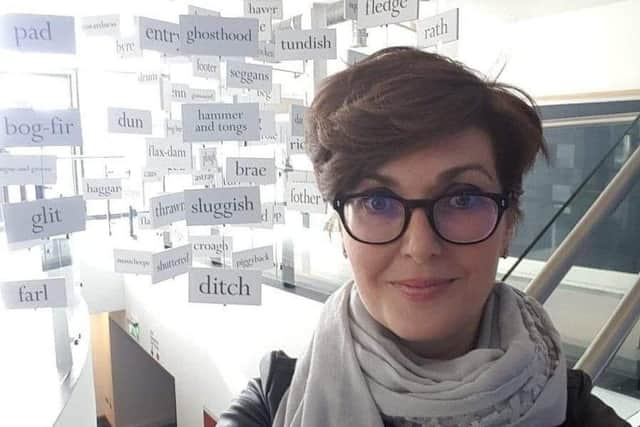

“The ones behind would have Post-it notes stuck on our backs so they were fine. But, I do remember that feeling of standing there on the front row on the Guildhall stage in your school uniform, realising that everyone was looking at you and the sweat lashing off you. And even writing the words on your hands and the sweat would make the writing run off. I never forgave those ones in the second row who looked like they knew the words.
“For weeks and weeks running up to the feis you’d be taken out of class and didn’t have to do any PE because it was practice for the school orchestra and choir that always took over. You were always there in the gym with Mrs McGinley putting you through your paces to ensure that when you walked onto that stage on the night you were absolutely representing the school and you were singing the best you ever could. There where high stakes involved.”
The amount of entrants for a single children’s competition in some disciplines at the feis was often in excess of 100 and sometimes bordered on 200. As a result, the standard of ability on display was frequently extremely high and it could prove to be a nerve-wracking experience.
Advertisement
Hide AdAdvertisement
Hide Ad“I remember being in a poetry competition and you’d be sitting there and you were number 114 or something like that. I always remember going on stage and being very nervous and you’d scan the crowd and I’d always find my mum’s face immediately. She’d always be sitting smiling, beaming out encouragement. I also remember doing cello in the Minor Hall and I was so nervous that my left leg started to shake and the whole cello was bouncing up and down. I don’t even remember getting through the piece. I must have played it and got to the end but in many ways it was a rite of passage. You had to enter the feis, you had to do it. It was the making of you. I was always Carita Kerr’s daughter so it was a tough act to follow. I think if you could stand up in front of a crowd on the Guildhall stage, in front of an adjudicator, it was very much a character building experience.
“I just also remember the committee, the women who ran things behind the scenes. And, there was such an old Derry status to it as well. You couldn’t let anybody down. You had to do it and you had to do it well. You always felt that if you mucked it up you’d be taken aside and given out to.”
Carita Kerr obviously still takes great pride in her time as a competitor at Derry Feis and recalled how the reputation of the institution wasn’t only confined to the north-western region of the island.
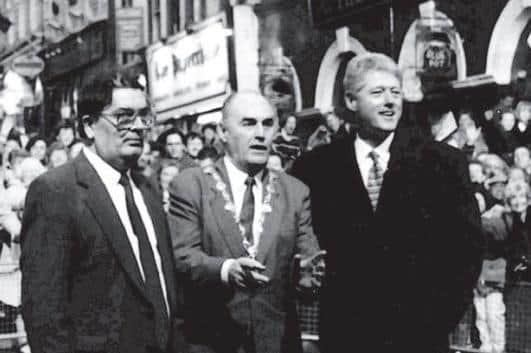

She said: “Marie-Louise has said that she thought I was the best singer there was. But quite a number of adjudicators thought the same thing. One female adjudicator referred to me the whole week as ‘the voice’.
Advertisement
Hide AdAdvertisement
Hide Ad“About six months afterwards John and I were down in Dublin at the RDS to watch Janet Baker, an English singer that I loved. We were walking down and I heard this person saying ‘oh, here comes the voice’. It was the same adjudicator and she was telling everybody around that she was an adjudicator at the Derry Feis and I heard a voice that I’d never heard in my life before. And I said to John, ‘can we move on please’. But it was wonderful. I tell that story because people knew about Derry Feis and knew about the calibre of performer. And I thought that was good, because word was going out to that whole Dublin musical crowd.”
Marie-Louise added: “In many ways you would have thought that Derry was geographically isolated, and we were. Then you also had the Troubles happening and people weren’t wanting to travel. I remember feeling that it was almost risky that we were getting into a car and driving to Derry. I keep going on about being in the Everglades, but I was so excited. It was amazing. I remember downstairs it used to have this bank of telephones. It was like this red leather circular banquette with all the telephones on it and I’d never seen anything so swish in my whole life - and then the Derry Feis and then a colour television in the bedroom.
“I remember the excitement and the thrill of staying in the Everglades. It was the swankiest place I’d ever been in. It was a really intoxicating time.
“But, it also felt important. It didn’t feel like Derry was isolated. It felt like it was very much front and centre as a centre of excellence for music. It was the place to be. I was in a choir in Newry and we travelled to Cork and places like that, but to me going to Derry was way more exciting and also much more significant. It meant something in my small world at that time.”
Advertisement
Hide AdAdvertisement
Hide AdCarita said: “The very fact you went on the stage as a soloist is character building for sure. You’re are shaking from the top of your body to the bottom of it, but you have to perform, you have to deliver. And, if you don’t you shouldn’t be there. It is an experience that you wish everybody could have.
“Those were heady days when you had all these great singers and choirs and all those tremendous dancers. The numbers have dwindled and fallen away.”
Marie-Louise added: “I’ve talked about these TV talent shows like Britain’s Got Talent, or X Factor or The Voice, but that’s what the feis was doing, minus the Simon Cowells and Louis Walsh or whoever. But that’s the same principle. In many ways it was doing that ahead of its time before the broadcasters got a hold of it.
“In terms of my own career path, when I moved from Newry to Derry I was very quiet and quite shy and in a way, the feis, the performance, the going on stage and having the discipline to learn something and then deliver it has stood me in such good stead when I go to interview somebody or when I stand on a stage and compere. I am always very aware of something that my mum always told me and that was ‘remember there is a granny in the very last row in the Guildhall who can’t hear very well and you have to project’. Having that experience of standing on a stage from a very young age has been very important for me.
Advertisement
Hide AdAdvertisement
Hide Ad“I made a documentary recently about Brian Friel and we were interviewing Stephen Rea in the Guildhall and I went up to look around before filming and I walked up those steps at the stage and that feeling came back. That feeling where you think your tummy is about to fall through and hit your knees and I always remembering James MacCafferty sitting there waiting.
“But you always did it and you always delivered. And, that moment of hearing your number called and walking up onto the stage. And then that abyss of space between you and walking out into that middle part of the stage and looking out. It’s a light-headed feeling but it’s so life-affirming and I would not be the person I am today if I hadn’t had that.
“I went to a feis in Newry, but it was never the same as Derry because of my mum, because of my dad and our ties here, it always meant something really, really significant to me.”
Asked what she thought the feis had contributed to the cultural life of Derry, Carita said: “I think you have to go back to the very beginning and the way it was set up and why it was set up. Mrs Edward Henry O’Doherty set it up because of the Troubles that were all around us at that time. She had a dream of keeping the Irish language intact and that’s why it was very much geared towards the Irish language. But she also knew there was a well of talent there not only in Derry but in the surrounding area that could make it great. She was the most unique person. She was the first voice teacher I ever had. Her brother during your lesson sat in the kitchen playing the violin but he was always waiting for me to come out after the lesson and he had a cup of tea ready. They were just a unique family. She was a wonderful, wonderful woman – she really was.”
Advertisement
Hide AdAdvertisement
Hide AdMarie-Louise added: “I know I’ve said this already but Derry is known for its singers, its sports people, its musicians and people outside the city say that every place has a group of people that sing. But it’s more embedded in Derry, something about the feis concentrated so many musicians and singers here. So when we were young we were fed through it and because of the discipline that was coming from the people who ran it you knew you weren’t in some half-baked show. It felt like a conveyor belt to success or to whatever you wanted to be. It allowed you to aspire within your own home town, among your own peers and among older people who understood the significance of it.
“I think in many ways the significance of it has been forgotten because it doesn’t have the resonance or the sex appeal of television shows. But, it has a huge significance. Just look at the singers and musicians who would all have been schooled through it. And schooled is the right word – and who came out of it and made careers out of it. I don’t think there’s one person who has a Derry connection who would not understand the DNA of the Derry Feis.”
Carita continued: “Besides the DNA, there was a family involvement about the feis and the people who ran it. We know about James MacCafferty and Giles Doherty, but I remember people like Sybil Sharkey who the secretary and Sybil was like a mother. You felt a great security when you saw her or any of the Sharkeys. You knew you’d have a great week and we’d come back again the next year.
“It was that family feeling that you weren’t coming to strangers and you weren’t going to be left alone. That was for sure.”